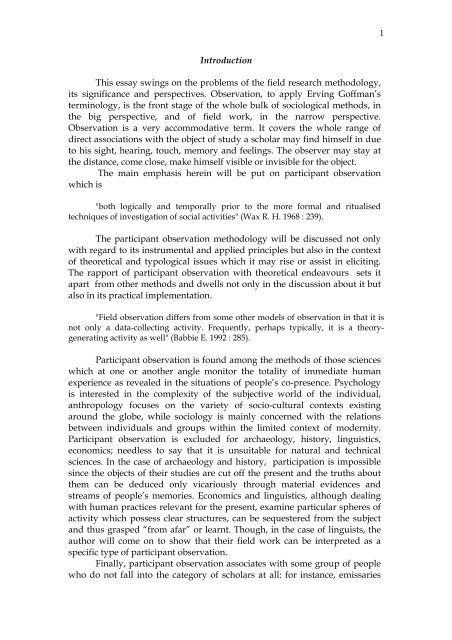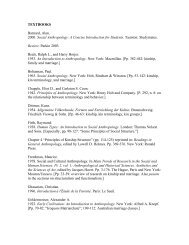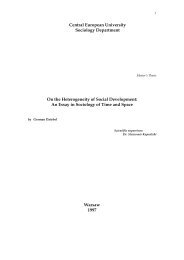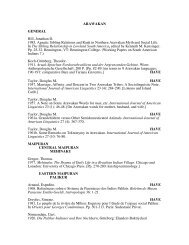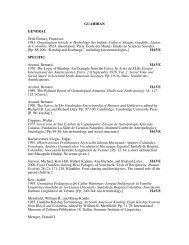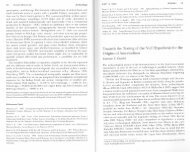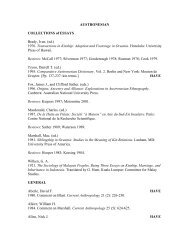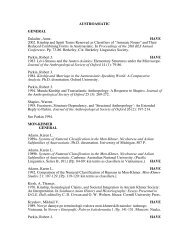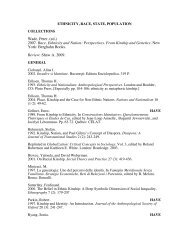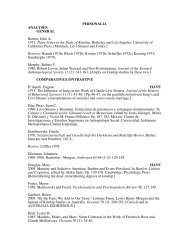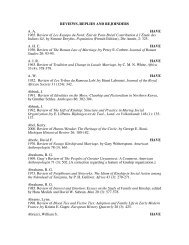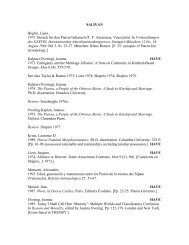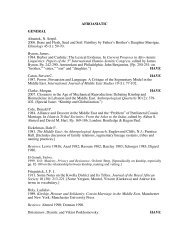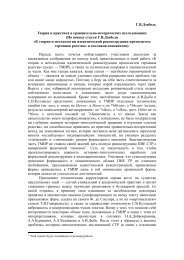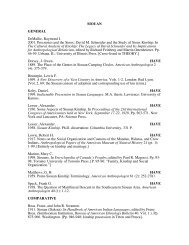1 Introduction This essay swings on the problems ... - Kinship Studies
1 Introduction This essay swings on the problems ... - Kinship Studies
1 Introduction This essay swings on the problems ... - Kinship Studies
You also want an ePaper? Increase the reach of your titles
YUMPU automatically turns print PDFs into web optimized ePapers that Google loves.
1<br />
<str<strong>on</strong>g>Introducti<strong>on</strong></str<strong>on</strong>g><br />
<str<strong>on</strong>g>This</str<strong>on</strong>g> <str<strong>on</strong>g>essay</str<strong>on</strong>g> <str<strong>on</strong>g>swings</str<strong>on</strong>g> <strong>on</strong> <strong>the</strong> <strong>problems</strong> of <strong>the</strong> field research methodology,<br />
its significance and perspectives. Observati<strong>on</strong>, to apply Erving Goffman’s<br />
terminology, is <strong>the</strong> fr<strong>on</strong>t stage of <strong>the</strong> whole bulk of sociological methods, in<br />
<strong>the</strong> big perspective, and of field work, in <strong>the</strong> narrow perspective.<br />
Observati<strong>on</strong> is a very accommodative term. It covers <strong>the</strong> whole range of<br />
direct associati<strong>on</strong>s with <strong>the</strong> object of study a scholar may find himself in due<br />
to his sight, hearing, touch, memory and feelings. The observer may stay at<br />
<strong>the</strong> distance, come close, make himself visible or invisible for <strong>the</strong> object.<br />
The main emphasis herein will be put <strong>on</strong> participant observati<strong>on</strong><br />
which is<br />
"both logically and temporally prior to <strong>the</strong> more formal and ritualised<br />
techniques of investigati<strong>on</strong> of social activities" (Wax R. H. 1968 : 239).<br />
The participant observati<strong>on</strong> methodology will be discussed not <strong>on</strong>ly<br />
with regard to its instrumental and applied principles but also in <strong>the</strong> c<strong>on</strong>text<br />
of <strong>the</strong>oretical and typological issues which it may rise or assist in eliciting.<br />
The rapport of participant observati<strong>on</strong> with <strong>the</strong>oretical endeavours sets it<br />
apart from o<strong>the</strong>r methods and dwells not <strong>on</strong>ly in <strong>the</strong> discussi<strong>on</strong> about it but<br />
also in its practical implementati<strong>on</strong>.<br />
"Field observati<strong>on</strong> differs from some o<strong>the</strong>r models of observati<strong>on</strong> in that it is<br />
not <strong>on</strong>ly a data-collecting activity. Frequently, perhaps typically, it is a <strong>the</strong>orygenerating<br />
activity as well" (Babbie E. 1992 : 285).<br />
Participant observati<strong>on</strong> is found am<strong>on</strong>g <strong>the</strong> methods of those sciences<br />
which at <strong>on</strong>e or ano<strong>the</strong>r angle m<strong>on</strong>itor <strong>the</strong> totality of immediate human<br />
experience as revealed in <strong>the</strong> situati<strong>on</strong>s of people’s co-presence. Psychology<br />
is interested in <strong>the</strong> complexity of <strong>the</strong> subjective world of <strong>the</strong> individual,<br />
anthropology focuses <strong>on</strong> <strong>the</strong> variety of socio-cultural c<strong>on</strong>texts existing<br />
around <strong>the</strong> globe, while sociology is mainly c<strong>on</strong>cerned with <strong>the</strong> relati<strong>on</strong>s<br />
between individuals and groups within <strong>the</strong> limited c<strong>on</strong>text of modernity.<br />
Participant observati<strong>on</strong> is excluded for archaeology, history, linguistics,<br />
ec<strong>on</strong>omics; needless to say that it is unsuitable for natural and technical<br />
sciences. In <strong>the</strong> case of archaeology and history, participati<strong>on</strong> is impossible<br />
since <strong>the</strong> objects of <strong>the</strong>ir studies are cut off <strong>the</strong> present and <strong>the</strong> truths about<br />
<strong>the</strong>m can be deduced <strong>on</strong>ly vicariously through material evidences and<br />
streams of people’s memories. Ec<strong>on</strong>omics and linguistics, although dealing<br />
with human practices relevant for <strong>the</strong> present, examine particular spheres of<br />
activity which possess clear structures, can be sequestered from <strong>the</strong> subject<br />
and thus grasped “from afar” or learnt. Though, in <strong>the</strong> case of linguists, <strong>the</strong><br />
author will come <strong>on</strong> to show that <strong>the</strong>ir field work can be interpreted as a<br />
specific type of participant observati<strong>on</strong>.<br />
Finally, participant observati<strong>on</strong> associates with some group of people<br />
who do not fall into <strong>the</strong> category of scholars at all: for instance, emissaries
2<br />
from private firms investigating <strong>the</strong> social situati<strong>on</strong> in a country or district<br />
before <strong>the</strong>ir firm installs its branch <strong>the</strong>re, detectives, writers, journalists,<br />
reporters etc. In <strong>the</strong> case of journalists, a good example is <strong>the</strong>ir activity in <strong>the</strong><br />
fr<strong>on</strong>ts during <strong>the</strong> World War II, when <strong>the</strong>y had not <strong>on</strong>ly to take notes but to<br />
hold arms as well.<br />
Between Observati<strong>on</strong> and Participati<strong>on</strong>: A Methodological Renditi<strong>on</strong><br />
of <strong>the</strong> Subject/Object Oppositi<strong>on</strong><br />
The problem of <strong>the</strong> relati<strong>on</strong>s between <strong>the</strong> subject and <strong>the</strong> object is<br />
pivotal to every scientific project. However <strong>on</strong>ly social sciences are dealing<br />
with rati<strong>on</strong>al and active objects which possess a highly unpredictable 'self'<br />
and can destroy <strong>the</strong> whole set of methodological pre-c<strong>on</strong>cepti<strong>on</strong>s and lead<br />
<strong>the</strong> researcher into <strong>the</strong> cul-de-sac. Every community which falls into <strong>the</strong><br />
focus of sociological or anthropological study possesses knowledge of a<br />
c<strong>on</strong>text, called by Robert Mert<strong>on</strong> '<strong>the</strong> insiders knowledge' (Mert<strong>on</strong> R. K. 1972)<br />
which is not given discursively to <strong>the</strong> researcher and which must be<br />
unear<strong>the</strong>d. Detached observati<strong>on</strong> as such, unlike, say, natural sciences, can<br />
not be in this situati<strong>on</strong> <strong>the</strong> <strong>on</strong>ly means of comprehensi<strong>on</strong> of <strong>the</strong> reality under<br />
study.<br />
Proceeding from <strong>the</strong>se circumstances, methodology offers a special<br />
approach which can help to resolve <strong>the</strong> main oppositi<strong>on</strong> and plough <strong>the</strong> way<br />
towards a successive investigati<strong>on</strong> into <strong>the</strong> now tamed object. Herbert<br />
Blumer describes this taming strategy, which is aptly called participant<br />
observati<strong>on</strong>, as follows:<br />
“To catch <strong>the</strong> process, <strong>the</strong> student must take <strong>the</strong> role of <strong>the</strong> acting unit whose<br />
behaviour he is studying. Since <strong>the</strong> interpretati<strong>on</strong> is being made by <strong>the</strong> acting unit in<br />
<strong>the</strong> terms of objects designated and appraised, meanings acquired and decisi<strong>on</strong>s<br />
made, <strong>the</strong> process has to be seen from <strong>the</strong> standpoint of <strong>the</strong> acting unit.... To try to<br />
catch <strong>the</strong> interpretative process by remaining 'aloof' as a so-called 'objective'<br />
observer and refusing to take <strong>the</strong> role of <strong>the</strong> acting unit is to risk <strong>the</strong> worst kind of<br />
subjectivism - <strong>the</strong> objective observer is likely to fill in <strong>the</strong> process of interpretati<strong>on</strong><br />
with his own surmises in place of catching <strong>the</strong> process as it occurs in <strong>the</strong> experience<br />
of <strong>the</strong> acting unit … uses it” (Blumer H. 1969 : 86).<br />
Failure to recognise <strong>the</strong> object as an acing unit has accompanied<br />
anthropology for quite a l<strong>on</strong>g while. Having encountered with ec<strong>on</strong>omically<br />
backward societies, anthropologists began with <strong>the</strong> interpretati<strong>on</strong> of <strong>the</strong><br />
blatant disparities between this bizarre reality and <strong>the</strong> "normal" European<br />
society <strong>on</strong> <strong>the</strong> basis of values and c<strong>on</strong>cepts found in <strong>the</strong> latter. The picture<br />
appeared to be even more queer that it had been initially.<br />
Alternatively, <strong>the</strong> researcher can not afford getting swamped by <strong>the</strong><br />
community studied, as it will cause <strong>the</strong> lost of <strong>the</strong> scholarly vantage point<br />
and <strong>the</strong> lapse into <strong>the</strong> c<strong>on</strong>ceptual framework of <strong>the</strong> object. Attachment to <strong>the</strong><br />
role of <strong>the</strong> acting unit should be injected with reas<strong>on</strong>able detachment from it
3<br />
which promises m<strong>on</strong>itoring those features of life of <strong>the</strong> object which can not<br />
be discerned from <strong>the</strong> inside.<br />
The unity of standpoints is <strong>the</strong> most desirable and ideal situati<strong>on</strong><br />
which, however, rarely can be set into being. Howard Becker is quite positive<br />
<strong>on</strong> this matter:<br />
"....We cannot c<strong>on</strong>struct a descripti<strong>on</strong> of a situati<strong>on</strong> or process that in some<br />
way fuses <strong>the</strong> percepti<strong>on</strong>s and interpretati<strong>on</strong>s made by both parties involved.... We<br />
cannot describe a 'higher reality' that makes sense of both sets of views. We can<br />
describe <strong>the</strong> perspectives of <strong>on</strong>e group and see how <strong>the</strong>y mesh with <strong>the</strong> perspectives<br />
of <strong>the</strong> o<strong>the</strong>r group.... But we cannot understand <strong>the</strong> situati<strong>on</strong> or process without<br />
giving full weight to <strong>the</strong> differences between <strong>the</strong> perspectives of <strong>the</strong> two groups<br />
involved" (Becker H. 1973 : 173).<br />
Participant observati<strong>on</strong>, <strong>the</strong>n, implies a certain rite de passage which<br />
aims at lowering <strong>the</strong> bar which separates <strong>the</strong> object of <strong>the</strong> study and <strong>the</strong><br />
researcher and gradual approximati<strong>on</strong> of a scholar's standpoint to <strong>the</strong><br />
standpoint of <strong>the</strong> acting unit.<br />
Observati<strong>on</strong> and <strong>the</strong> Roles of <strong>the</strong> Observer<br />
The spatial and temporal frame of <strong>the</strong> relati<strong>on</strong>s between <strong>the</strong> subject<br />
and <strong>the</strong> object of field research can be used for building <strong>the</strong> c<strong>on</strong>tinuum of <strong>the</strong><br />
observer's roles. Raym<strong>on</strong>d Gold (Gold R. 1969 : 30-39) marked out four<br />
distinctive roles: complete participant, participant-as-observer, observer-asparticipant<br />
and complete participant.<br />
The complete participant is a scholar who takes part in group activities<br />
genuinely or through pretensi<strong>on</strong>. His student identity is ei<strong>the</strong>r tantamount to<br />
his identity as a casual pers<strong>on</strong> or unknown to <strong>the</strong> people he studies. A<br />
situati<strong>on</strong> from <strong>the</strong> author's anthropological field practice am<strong>on</strong>g <strong>the</strong> Erzya-<br />
Mordvinian rural populati<strong>on</strong> in Samara Province, Russia, in 1995-1996 can be<br />
cited as a typical example. The culture authorities in a Mordvinian village<br />
were arranging <strong>the</strong> celebrati<strong>on</strong> of <strong>the</strong> commemorati<strong>on</strong> day. Folk singers and<br />
dancers (mostly, elderly people) had to be ga<strong>the</strong>red from o<strong>the</strong>r villages. For<br />
this purpose, a bus was needed. The bus could be provided <strong>on</strong>ly by <strong>the</strong><br />
village administrative authorities. The culture workers were far from being in<br />
good terms with <strong>the</strong> administrati<strong>on</strong> and did not dare to meet <strong>the</strong>m and spell<br />
out <strong>the</strong>ir request. Needless to say, that <strong>the</strong> author himself was extremely<br />
interested in <strong>the</strong> forthcoming event and he offered his help in making <strong>the</strong><br />
arrangements with <strong>the</strong> power. During <strong>the</strong> negotiati<strong>on</strong>s, which proved to be<br />
successful, <strong>the</strong> author was acting, <strong>on</strong> <strong>on</strong>e hand, as a complete participant<br />
because his primary goal was not to study but to make arrangements for <strong>the</strong><br />
study. He was <strong>on</strong> equal terms with <strong>the</strong> collocutors and himself served as <strong>the</strong><br />
object of observati<strong>on</strong>. On <strong>the</strong> o<strong>the</strong>r hand, he could perform <strong>the</strong> role of <strong>the</strong><br />
observer since he could draw informati<strong>on</strong> about <strong>the</strong> behaviour of <strong>the</strong> local<br />
authorities toward <strong>the</strong> stranger. Such situati<strong>on</strong>s when a researcher lapses in<br />
complete participati<strong>on</strong> and his participati<strong>on</strong>al and observati<strong>on</strong>al modes of
ehaviour overlap are quite comm<strong>on</strong> though <strong>the</strong>y happen by occasi<strong>on</strong> and are<br />
rarely sought for.<br />
There is also ano<strong>the</strong>r set of situati<strong>on</strong>s where <strong>the</strong> researcher inevitably<br />
acts as a complete participant. It refers to <strong>the</strong> first c<strong>on</strong>tact with <strong>the</strong> group or<br />
with an informant which often occurs unexpectedly for <strong>the</strong> latter. The field<br />
worker being seen as a stranger and just as a stranger, it is too early to speak<br />
about any particular method involved, except for <strong>the</strong> method of venturing<br />
into <strong>the</strong> field work. <str<strong>on</strong>g>This</str<strong>on</strong>g> first encounter with <strong>the</strong> object has proved to be<br />
highly interesting in <strong>the</strong> course of author's field research. Unexpectedness is<br />
here very profiting and, being taken by surprise, a pers<strong>on</strong> may disclose some<br />
patterns of behaviour which o<strong>the</strong>rwise might have been hard to catch out.<br />
The participant-as-observer always declares his interests as a scholar<br />
but still tries to enjoy full participati<strong>on</strong> in <strong>the</strong> social activities under study.<br />
<str<strong>on</strong>g>This</str<strong>on</strong>g> situati<strong>on</strong> happens when, for instance, <strong>the</strong> researcher makes friends with<br />
some members of <strong>the</strong> populati<strong>on</strong> under study and participates in <strong>the</strong> regular<br />
routines, such as parties or everyday meals. It often occurs when he comes to<br />
live in a family bel<strong>on</strong>ging to <strong>the</strong> group observed. The observati<strong>on</strong> runs<br />
smoo<strong>the</strong>r in comparis<strong>on</strong> with complete participati<strong>on</strong>, because scholar's<br />
attenti<strong>on</strong> is not deflected <strong>on</strong> <strong>the</strong> sort of routine, which asks for <strong>the</strong> efforts<br />
unusual and unnecessary for <strong>the</strong> purpose of study, and is not undermined by<br />
<strong>the</strong> exposure of <strong>the</strong> identity o<strong>the</strong>r than that of <strong>the</strong> scholar.<br />
The observer-as-participant does not participate in <strong>the</strong> activities with<br />
his pers<strong>on</strong>al identity involved. His associati<strong>on</strong> with <strong>the</strong> object's pursuits takes<br />
form of an experiment which is in no way relevant to his regular activities<br />
which are indifferent to <strong>the</strong> locality and situati<strong>on</strong>. For example, studying <strong>the</strong><br />
funeral rites am<strong>on</strong>g <strong>the</strong> Mordvinians, <strong>the</strong> author chanced at taking part in <strong>the</strong><br />
wake and joined <strong>the</strong> members of <strong>the</strong> bereaving family in "drinking <strong>the</strong><br />
diseased over". <str<strong>on</strong>g>This</str<strong>on</strong>g> acti<strong>on</strong> was brought about by <strong>the</strong> wish to mingle and<br />
understand <strong>the</strong> process through imitati<strong>on</strong>.<br />
The complete observer always stays aloof and m<strong>on</strong>itors <strong>the</strong> events<br />
without doing an attempt to share <strong>the</strong> experience with <strong>the</strong> object of his study.<br />
One may come to <strong>the</strong> church and witness <strong>the</strong> serm<strong>on</strong> or prayer, attend <strong>the</strong><br />
football match and observe <strong>the</strong> behaviour of <strong>the</strong> players, come to <strong>the</strong> market<br />
and record <strong>the</strong> acti<strong>on</strong>s of <strong>the</strong> customers and salesmen.<br />
The aforementi<strong>on</strong>ed roles, which <strong>the</strong> observer normally takes, form a<br />
scale based <strong>on</strong> <strong>the</strong> measure of spatial and behavioural proximity between <strong>the</strong><br />
researcher and <strong>the</strong> object. While complete participati<strong>on</strong> involves <strong>the</strong> closest<br />
attachment to <strong>the</strong> latter, complete observati<strong>on</strong> presumes <strong>the</strong> o<strong>the</strong>r extreme,<br />
that of <strong>the</strong> total detachment. Practical c<strong>on</strong>sequences of <strong>the</strong>se<br />
attachment/detachment routines lie in <strong>the</strong> extent to which <strong>the</strong> scholar affects<br />
<strong>the</strong> surroundings he studies. Complete participati<strong>on</strong> and complete<br />
observati<strong>on</strong> c<strong>on</strong>verge in this respect, since in both cases <strong>the</strong> scientist does not<br />
act in <strong>the</strong> way which people can interpret as discrepant from <strong>the</strong>ir<br />
expectati<strong>on</strong>s. Participati<strong>on</strong>-as-observati<strong>on</strong> and observati<strong>on</strong>-as-participati<strong>on</strong><br />
levels are most vulnerable in terms of influences exerted and most profiting in<br />
terms of gains achieved.<br />
4
5<br />
It seems reas<strong>on</strong>able to distinguish between practical and discursive<br />
modes of participati<strong>on</strong> which, while doing his study, <strong>the</strong> researcher may get<br />
involved in. <str<strong>on</strong>g>This</str<strong>on</strong>g> distincti<strong>on</strong> is important, as <strong>the</strong> character of data which <strong>the</strong><br />
observer thus ga<strong>the</strong>rs is drastically different and <strong>the</strong> influence of <strong>the</strong> speaking<br />
observer and <strong>the</strong> acting observer <strong>on</strong> <strong>the</strong> surroundings is also different.<br />
The participant-as-observer who enters into a c<strong>on</strong>versati<strong>on</strong> with <strong>the</strong><br />
object is likely to invoke informati<strong>on</strong> which is more clear and ready-made<br />
than <strong>the</strong> informati<strong>on</strong> which he has to draw for a silent m<strong>on</strong>itoring of <strong>the</strong><br />
reality. Alternatively, <strong>the</strong> o<strong>the</strong>r side of <strong>the</strong> coin is that he may draw special<br />
attenti<strong>on</strong> to his pers<strong>on</strong>ality and alter <strong>the</strong> normal behaviour of <strong>the</strong> object. For<br />
instance, a scholar, who plays soccer and does a study in <strong>the</strong> behaviour of <strong>the</strong><br />
players in different games <strong>on</strong> <strong>the</strong> field, may give a verbal command to his<br />
fellow-players to change <strong>the</strong>ir locati<strong>on</strong> or to pay more attenti<strong>on</strong> to a rival's<br />
disturbing forward. <str<strong>on</strong>g>This</str<strong>on</strong>g> break in <strong>the</strong> game routine may be interpreted by <strong>the</strong><br />
players as something related not to <strong>the</strong> game itself but to <strong>the</strong> research interests<br />
of <strong>the</strong> scholar. However, by active verbal intrusi<strong>on</strong> into <strong>the</strong> course of <strong>the</strong><br />
game, <strong>the</strong> observer is likely to create many experimental situati<strong>on</strong>s fraught<br />
with unusual informati<strong>on</strong>.<br />
The significance of discursive participati<strong>on</strong> grows high when <strong>the</strong> field<br />
work in a foreign-language community is at stake. The participant who does<br />
not speak <strong>the</strong> language of <strong>the</strong> community diminishes essentially his<br />
opportunities both as <strong>the</strong> participant and as <strong>the</strong> observer. The work with an<br />
interpreter may instantaneously remove <strong>the</strong> scholar from <strong>the</strong> positi<strong>on</strong> of <strong>the</strong><br />
participant to <strong>the</strong> positi<strong>on</strong> of <strong>the</strong> observer. Knowledge of <strong>the</strong> community's<br />
language, c<strong>on</strong>versely, opens up a wide range of research opportunities and<br />
enhances researcher's involvement in <strong>the</strong> life of <strong>the</strong> object. In this respect,<br />
linguists practice mostly this type of participant observati<strong>on</strong> which may be<br />
designated discursive participati<strong>on</strong>-as-observati<strong>on</strong>. As a distinct method,<br />
discursive participati<strong>on</strong>-as-observati<strong>on</strong> is well expressed in <strong>the</strong> gamut of<br />
ethnomethodological experiments. Without bringing his scientific identity to<br />
<strong>the</strong> fore, a scholar may set in train a discussi<strong>on</strong>, in which he would equally<br />
participate, with <strong>the</strong> aim of getting informati<strong>on</strong> about <strong>the</strong> situati<strong>on</strong>. A wellknown<br />
example of this technique is following:<br />
“On Friday night my husband and I were watching televisi<strong>on</strong>. My husband<br />
remarked that he was tired. I asked, ‘How are you tired Physically, mentally, or just<br />
bored’ ”<br />
(S) I d<strong>on</strong>’t know, I guess physically, mainly.<br />
(T) You mean that your muscles ache or your b<strong>on</strong>es<br />
(U) I guess so. D<strong>on</strong>’t be so technical.<br />
(After more watching)<br />
(S) All <strong>the</strong>se old movies have <strong>the</strong> same kind of old ir<strong>on</strong> bedstead in <strong>the</strong>m.<br />
(T) What do you mean Do you mean all old movies, or some of <strong>the</strong>m, or just<br />
<strong>the</strong> <strong>on</strong>es you have seen<br />
(S) What <strong>the</strong> matter with you You know what I mean.<br />
(T) I wish you would be more specific.<br />
(S) You know what I mean. Drop dead! (Garfinkel H. 1994 : 43).
6<br />
In this perspective, <strong>the</strong> interview should be regarded as a distinct type<br />
of observati<strong>on</strong> which is best to call discursive observati<strong>on</strong>-as-participati<strong>on</strong>.<br />
Methodologists not accidentally regard <strong>the</strong> interview "a special case of social<br />
interacti<strong>on</strong> between two pers<strong>on</strong>s" (Bailey K. D. 1994 : 176). The scholar<br />
deliberately prompts a pers<strong>on</strong> to formulate discursively his experience for <strong>the</strong><br />
sole purpose of ga<strong>the</strong>ring data. Al<strong>on</strong>gside of discursive participati<strong>on</strong>-asobservati<strong>on</strong>,<br />
it is more subject to errors and biases <strong>on</strong> <strong>the</strong> part of <strong>the</strong><br />
researcher and to <strong>the</strong> deliberate deceit <strong>on</strong> <strong>the</strong> part of <strong>the</strong> informant. The<br />
scholar is likely to face up with <strong>the</strong> overt hostility which proceeds from <strong>the</strong><br />
lack of his practical involvement with <strong>the</strong> resp<strong>on</strong>dent. Herbert Hyman reports<br />
a situati<strong>on</strong> when a resp<strong>on</strong>dent was<br />
"instructed to be hostile, uncooperative, and suspicious of <strong>the</strong> entire situati<strong>on</strong>.<br />
He generally required c<strong>on</strong>siderable persuasi<strong>on</strong> to answer many of <strong>the</strong> questi<strong>on</strong>s at all<br />
and was <strong>on</strong> <strong>the</strong> whole quite vicious with <strong>the</strong> interviewer" (Bailey K. D. 1994 : 177).<br />
Alternatively, <strong>the</strong> interview allows to c<strong>on</strong>struct right <strong>on</strong> <strong>the</strong> spot a<br />
coherent picture of <strong>the</strong> social reality and to observe <strong>the</strong> subject's behaviour in<br />
<strong>the</strong> specific and unexpected situati<strong>on</strong>.<br />
Al<strong>on</strong>g with those examples and techniques which were discussed<br />
above in c<strong>on</strong>necti<strong>on</strong> with Gold's typology, practical observati<strong>on</strong>-as-participati<strong>on</strong><br />
may include those situati<strong>on</strong>s where <strong>the</strong> researcher himself is <strong>the</strong> cause of an<br />
event happening within <strong>the</strong> community studied. For instance, during author's<br />
expediti<strong>on</strong> to <strong>the</strong> Mordvinians in 1996, a local activist for <strong>the</strong> Mordvinian<br />
nati<strong>on</strong>al revival, <strong>on</strong> learning about <strong>the</strong> people who had come from St.<br />
Petersburg to study traditi<strong>on</strong>al life and modern c<strong>on</strong>diti<strong>on</strong>s of her community,<br />
organised a home recepti<strong>on</strong>. <str<strong>on</strong>g>This</str<strong>on</strong>g> home recepti<strong>on</strong> turned to be a windowdressing<br />
affair, since <strong>the</strong> woman wanted to c<strong>on</strong>vey <strong>the</strong> impressi<strong>on</strong> of <strong>the</strong><br />
Mordvinian having high nati<strong>on</strong>al self-c<strong>on</strong>sciousness: she dressed her children<br />
and grandchildren in fake traditi<strong>on</strong>al costumes, invited old people to sing<br />
traditi<strong>on</strong>al s<strong>on</strong>gs and made her best to c<strong>on</strong>vince <strong>the</strong> guests that that was a<br />
casual way of partying in <strong>the</strong> modern village. Fur<strong>the</strong>rmore, this event<br />
disclosed certain structural regularities in <strong>the</strong> inter-village group relati<strong>on</strong>s,<br />
since ano<strong>the</strong>r group of people, who had not been invited to <strong>the</strong> recepti<strong>on</strong>, rose<br />
up to a str<strong>on</strong>g disapproval of <strong>the</strong> acti<strong>on</strong> and said that <strong>the</strong>y had never before<br />
supported <strong>the</strong> artificial endeavours of that woman's clique to squeeze <strong>the</strong><br />
traditi<strong>on</strong>ality out of <strong>the</strong> community. In this case, <strong>the</strong> researcher does not <strong>on</strong>ly<br />
follow up <strong>the</strong> routines of <strong>the</strong> populati<strong>on</strong> under study but also, by its very<br />
presence, sets in train unusual and experiment-like practical situati<strong>on</strong>s. A<br />
scholar's two-fold - anthropological and sociological - interests may form a<br />
useful bricolage: people c<strong>on</strong>centrate <strong>on</strong> his anthropological identity and<br />
provide him with a distorted informati<strong>on</strong> but feel free in o<strong>the</strong>r modes of<br />
acti<strong>on</strong> which sociologists are particularly keen <strong>on</strong>.<br />
At <strong>the</strong> extreme poles of <strong>the</strong> scale at stake here, <strong>the</strong> discursive and<br />
practical modes of interacti<strong>on</strong> between <strong>the</strong> researcher and <strong>the</strong> object tend to<br />
c<strong>on</strong>verge. The complete participant is caught in <strong>the</strong> free current of experience
7<br />
where normally <strong>the</strong> discursive and practical behaviour are inseparable. The<br />
complete observer, <strong>on</strong> <strong>the</strong> o<strong>the</strong>r hand, rarely reveals himself ei<strong>the</strong>r practically<br />
or discursively. In <strong>the</strong> first case, researcher's discursiveness and practicality<br />
attain <strong>the</strong>ir climax, while in <strong>the</strong> last case <strong>the</strong>y are brought to naught.<br />
Thus, <strong>on</strong>e may built <strong>the</strong> following scheme of distributi<strong>on</strong> of<br />
observati<strong>on</strong>al techniques which is, seemingly, more flexible and precise than<br />
that introduced by Gold:<br />
complete<br />
observati<strong>on</strong><br />
discursive<br />
participati<strong>on</strong>-as-observati<strong>on</strong><br />
practical<br />
participati<strong>on</strong>-as-observati<strong>on</strong><br />
discursive<br />
observati<strong>on</strong>-as- participati<strong>on</strong><br />
practical<br />
observati<strong>on</strong>-as- participati<strong>on</strong><br />
complete<br />
participati<strong>on</strong><br />
The roles which <strong>the</strong> researcher may take over are to be treated as <strong>the</strong><br />
integral and interwoven parts of a single investigati<strong>on</strong> and as distinct<br />
methodological strategies to which <strong>the</strong> whole process of field work can be<br />
reduced. In some cases, <strong>the</strong> practical modes of interacti<strong>on</strong> with <strong>the</strong> object are<br />
preferable, in o<strong>the</strong>rs <strong>the</strong> discursive modes are optimal. For example, <strong>the</strong><br />
observati<strong>on</strong> of a religious service, naturally, excludes <strong>the</strong> discursive<br />
participati<strong>on</strong>, while in <strong>the</strong> profane sphere of people's behaviour it is more<br />
than affordable.<br />
Participant observati<strong>on</strong> is <strong>the</strong> syn<strong>the</strong>sis of all <strong>the</strong> aforementi<strong>on</strong>ed types<br />
of <strong>the</strong> subject/object relati<strong>on</strong>ships. In <strong>the</strong> course of <strong>the</strong> XX century, it has been<br />
<strong>the</strong> most popular and fruitful method of sociological and anthropological<br />
investigati<strong>on</strong>. Becker and o<strong>the</strong>rs summarised its advantages in <strong>the</strong> following<br />
way:<br />
“Such a method afforded us <strong>the</strong> greatest opportunity to discover what things<br />
were of importance to <strong>the</strong> people we were studying and to follow up <strong>the</strong><br />
interc<strong>on</strong>necti<strong>on</strong>s of those phenomena” (Becker H., Geer B., Hughes E. C. Strauss A.<br />
L. 1977 : 23).<br />
The Recycling Observati<strong>on</strong>: Towards <strong>the</strong> Appraisal of Complete<br />
Participati<strong>on</strong><br />
The simplest logic of scientific procedures implies that <strong>the</strong> research is<br />
led in <strong>on</strong>e directi<strong>on</strong>, that is from <strong>the</strong> subject towards <strong>the</strong> object, from <strong>the</strong><br />
researcher towards <strong>the</strong> community under study, from observati<strong>on</strong> to<br />
participati<strong>on</strong>. The researcher makes sense of various strategies described<br />
above, namely complete participati<strong>on</strong>, complete observati<strong>on</strong>, discursive<br />
participati<strong>on</strong>-as-observati<strong>on</strong>, discursive observati<strong>on</strong>-as-participati<strong>on</strong>, practical<br />
observati<strong>on</strong>-as-participati<strong>on</strong>. practical participati<strong>on</strong>-as-observati<strong>on</strong>, and ei<strong>the</strong>r<br />
stepwise or at <strong>on</strong>e go lays a bridge between <strong>the</strong> two poles of <strong>the</strong> c<strong>on</strong>tinuum.
So far, it has been rarely menti<strong>on</strong>ed that for social sciences, again in<br />
view of <strong>the</strong> active positi<strong>on</strong> of <strong>the</strong> object, <strong>the</strong> procedure of investigati<strong>on</strong> can be<br />
inverted. Primarily, it c<strong>on</strong>cerns <strong>the</strong> cases when <strong>the</strong> researcher comes from an<br />
ethnic milieu and undertakes a study based <strong>on</strong> his exclusive experience as a<br />
member of this ethnic group. He acquires methodological skills in order to<br />
understand <strong>the</strong> realities of his own group. In anthropology it is often <strong>the</strong> case<br />
with <strong>the</strong> members of ethnic minorities or <strong>the</strong> indigenous people from, say,<br />
Africa who come to <strong>the</strong> principal European and American universities to<br />
c<strong>on</strong>ceptualise <strong>the</strong> aspects of life in <strong>the</strong>ir respective communities.<br />
The research in <strong>the</strong>se cases starts from participati<strong>on</strong>, moves towards<br />
observati<strong>on</strong>al skills obtained in <strong>the</strong> outsiders’ (in Mert<strong>on</strong>’s sense of <strong>the</strong> word)<br />
group and ends up with recycling of <strong>the</strong> native experience in terms of<br />
scientific knowledge.<br />
A similar situati<strong>on</strong> sometimes can be observed am<strong>on</strong>g <strong>the</strong> outsiderscholars.<br />
For instance, Becker did his analysis of <strong>the</strong> dance musician milieu <strong>on</strong><br />
<strong>the</strong> basis of his own adolescent experience as a professi<strong>on</strong>al musician. Strictly<br />
speaking, Becker’s case bears some traits of casual participant observati<strong>on</strong>,<br />
since even at that time he was sociologically interested in <strong>the</strong> social relati<strong>on</strong>s<br />
am<strong>on</strong>g <strong>the</strong> dance musicians, was making notes and did not disclose his<br />
identity as a sociologist to his fellow-musicians (Becker H. 1973 : 84-85).<br />
However his identity as a musician and his identity as a sociologist were at<br />
least equally expressed and he did not have to scale down <strong>the</strong> latter in order<br />
to get right understanding of <strong>the</strong> object.<br />
O<strong>the</strong>r scholars have also extensively used <strong>the</strong>ir own insiders’<br />
knowledge. Goffman should be specially menti<strong>on</strong>ed in this c<strong>on</strong>text. His books<br />
Presentati<strong>on</strong> of Self in Everyday Life (Goffman E. 1959), Interacti<strong>on</strong> Ritual<br />
(Goffman E. 1967), Behaviour in Public Places (Goffman E. 1963) and some<br />
o<strong>the</strong>rs, to a c<strong>on</strong>siderable extent, are based <strong>on</strong> <strong>the</strong> knowledge of social skills<br />
which every member of Euro-American society acquires through<br />
socialisati<strong>on</strong>. Goffman had been in touch with <strong>the</strong> situati<strong>on</strong>s addressed in his<br />
books even before he became a sociologist. Afterwards he, certainly, built to<br />
this initial knowledge <strong>the</strong> informati<strong>on</strong> ga<strong>the</strong>red by means of participant<br />
observati<strong>on</strong>.<br />
Ano<strong>the</strong>r example which may be included in <strong>the</strong> category discussed is<br />
<strong>the</strong> book Homo Academicus by Pierre Bourdieu (Bourdieu P. 1990). Analysing<br />
<strong>the</strong> structure and social relati<strong>on</strong>s within French academic system, he acts as a<br />
complete participant who makes a bridge to a detached and objective vantage<br />
point.<br />
The author himself has recently undertaken a research in social<br />
relati<strong>on</strong>s within <strong>the</strong> Indianist community in Russia (Dziebel G. V. 1997).<br />
Indianists are <strong>the</strong> white people caught up with <strong>the</strong> American Indian culture<br />
and perceiving <strong>the</strong> American Indian spiritual heritage as a core part of <strong>the</strong>ir<br />
own life experience. From 1987 to 1991, while a sec<strong>on</strong>dary school pupil and<br />
<strong>the</strong>n a student of <strong>the</strong> Department of Anthropology of St. Petersburg State<br />
University, <strong>the</strong> author was an active member of <strong>the</strong> Indianist community in<br />
Russia and fully shared its values, goals and mood. It was a period of intense<br />
8
pers<strong>on</strong>al c<strong>on</strong>tacts, deep emoti<strong>on</strong>al involvement and a quest for <strong>the</strong> reas<strong>on</strong>s<br />
and grounds of <strong>the</strong> life-path which seemed as important for <strong>the</strong> people inside<br />
<strong>the</strong> community, as it was c<strong>on</strong>sidered strange and freakish by <strong>the</strong> outsiders.<br />
The author was a complete participant in group’s activities and never figured<br />
out that it could be studied.<br />
The recycling observati<strong>on</strong> reveals some significant advantages in<br />
comparis<strong>on</strong> to <strong>the</strong> casual participant observati<strong>on</strong> (cf. (Bailey K. D. 1994 : 245-<br />
246)).<br />
First, <strong>the</strong> researcher possesses full insider’s knowledge of a community<br />
and <strong>the</strong>re can be no gaining entry problem which o<strong>the</strong>rwise stands ra<strong>the</strong>r<br />
sharply. The unity of standpoints, which, in <strong>the</strong> traditi<strong>on</strong>al view expressed by<br />
Becker, is unattainable, here is in full play.<br />
Sec<strong>on</strong>d, this deep knowledge is gained without any adverse impact <strong>on</strong><br />
<strong>the</strong> research procedure and without any influence <strong>on</strong> <strong>the</strong> community which<br />
in <strong>the</strong> case of participant observati<strong>on</strong> is unavoidable.<br />
Third, his point of view may be c<strong>on</strong>sidered objective, since he not <strong>on</strong>ly<br />
knows <strong>the</strong> subject matter from <strong>the</strong> inside but also combines it with an<br />
aposteriori detached m<strong>on</strong>itoring. The problem of reliability, which is rendered<br />
as <strong>the</strong> lack of guarantees that ano<strong>the</strong>r observer would produce <strong>the</strong> same<br />
model (Becker H. 1968 : 236), is here out of questi<strong>on</strong>. Obviously, in order to<br />
c<strong>on</strong>struct a model which would c<strong>on</strong>test <strong>the</strong> reliability of <strong>the</strong> first <strong>on</strong>e, ano<strong>the</strong>r<br />
researcher must have <strong>the</strong> same insider’s background.<br />
Fourth, <strong>the</strong> sample size of <strong>the</strong> recycling observati<strong>on</strong> is c<strong>on</strong>siderably<br />
bigger than that of <strong>the</strong> casual participant observati<strong>on</strong>, as <strong>the</strong> number of people<br />
whom a member of a community c<strong>on</strong>tacts during his normal day-to-day<br />
routine can not be surmounted by any field study.<br />
Fifth, <strong>the</strong> recycling observati<strong>on</strong> escapes from <strong>the</strong> oppositi<strong>on</strong> between<br />
<strong>the</strong> advantages and disadvantages of natural envir<strong>on</strong>ment and artificial<br />
laboratory setting.<br />
In all <strong>the</strong>se cases, complete participati<strong>on</strong>, to more or less extent, figures<br />
as <strong>the</strong> starting point of investigati<strong>on</strong>, from which <strong>the</strong> researcher gradually<br />
moves towards a detached observati<strong>on</strong>. The latter takes form of an extremely<br />
detached approach exerted from <strong>the</strong> “cock-pit”. It is worth menti<strong>on</strong>ing that<br />
this inverted movement is an integral part of every sociological and<br />
anthropological research, since <strong>the</strong> scholar, up<strong>on</strong> finishing up <strong>the</strong> field work,<br />
comes back to his cabinet and afterwards presents his results in written<br />
works, at <strong>the</strong> c<strong>on</strong>ferences or in private c<strong>on</strong>versati<strong>on</strong>s. He appears now not as<br />
an outsider but as an insider who is subject to participant or n<strong>on</strong>-participant<br />
observati<strong>on</strong> <strong>on</strong> <strong>the</strong> part of his colleagues.<br />
The recycling observati<strong>on</strong> is most valuable for <strong>the</strong> study of deviant<br />
communities, since usually it is <strong>the</strong>re that <strong>the</strong> insider’s knowledge is highly in<br />
need. However here lies <strong>the</strong> main disadvantage of <strong>the</strong> method of recycling<br />
observati<strong>on</strong>. The researcher rarely chances to have an old experience of living<br />
in a deviant community and this objective obstacle inhibits it from becoming a<br />
casual sociological practice. Also, <strong>the</strong> recycling observati<strong>on</strong> asks for <strong>the</strong><br />
complete psychological detachment of <strong>the</strong> researcher, at <strong>the</strong> time of writing,<br />
9
10<br />
from <strong>the</strong> milieu which he studies by recycling. In this respect, <strong>the</strong> gist of this<br />
kind of observati<strong>on</strong> is c<strong>on</strong>trary to <strong>the</strong> essence of participant observati<strong>on</strong>. The<br />
case with <strong>the</strong> scholars from ethnic minorities shows that <strong>the</strong>y rarely can cut<br />
<strong>the</strong>mselves off from <strong>the</strong>ir background and often go in for science with <strong>the</strong> sole<br />
purpose to stay within <strong>the</strong>ir native milieus and get m<strong>on</strong>ey for that (Medicin B.<br />
1987 : 296). The third disadvantage of <strong>the</strong> recycling observati<strong>on</strong> is <strong>the</strong> extent of<br />
reliability of scholar’s memory which, c<strong>on</strong>trary to participant observati<strong>on</strong>,<br />
may not be bolstered by making notes.<br />
Al<strong>on</strong>g with those cases when <strong>the</strong> recycling observati<strong>on</strong> is <strong>the</strong> ideal,<br />
though excepti<strong>on</strong>al, method of social research, its principles can be utilised for<br />
<strong>the</strong> situati<strong>on</strong>s when researcher’s life had not provided him with such an<br />
advantageous experience. The researcher, up<strong>on</strong> coming to <strong>the</strong> field, should c<strong>on</strong>sider<br />
his experience <strong>the</strong>re as significant primarily for his own life and sec<strong>on</strong>darily for <strong>the</strong><br />
immediate goals of study. He should be active and not be afraid of spoiling <strong>the</strong><br />
o<strong>the</strong>rwise unsullied reality. It is impossible not to infuse <strong>the</strong> observed reality<br />
with researcher’s own attitudes and prec<strong>on</strong>cepti<strong>on</strong>s and, perhaps, it is better<br />
not to suppress it at all. A lay pers<strong>on</strong> who enters ano<strong>the</strong>r milieu does not<br />
disrupt it by his intrusi<strong>on</strong>: his emergence <strong>the</strong>re c<strong>on</strong>stitutes a part of <strong>the</strong><br />
normal life of <strong>the</strong> community. The researcher should be a free and active<br />
participant in <strong>the</strong> field, to behave in <strong>the</strong> manner which would have been<br />
suitable for him if he chanced to enter an alien circle without having<br />
‘sociological thoughts’ behind him. Finally, he should train his memory<br />
because <strong>the</strong> interacti<strong>on</strong> without recording is a powerful means of integrating<br />
into <strong>the</strong> community and, by relying up<strong>on</strong> his memory, <strong>the</strong> researcher would<br />
behave in <strong>the</strong> most natural way - in <strong>the</strong> way which all <strong>the</strong> members of <strong>the</strong><br />
community follow. The path of natural and complete participati<strong>on</strong>, which <strong>the</strong><br />
field researcher is advised to take, should go hand-in-hand with complete and<br />
intensive observati<strong>on</strong>. The field researcher is not <strong>the</strong> <strong>on</strong>e who sees things in<br />
<strong>the</strong> same way as <strong>the</strong> members of <strong>the</strong> community see <strong>the</strong>m, he is <strong>the</strong> <strong>on</strong>e who<br />
sees <strong>the</strong>m better.<br />
C<strong>on</strong>clusi<strong>on</strong><br />
An attempt has been made to put toge<strong>the</strong>r different types of<br />
relati<strong>on</strong>ship which exist between <strong>the</strong> subject and <strong>the</strong> object of field research.<br />
The whole process of field research, in author’s opini<strong>on</strong>, should be taken as a<br />
part of general framework of <strong>the</strong> scientific procedure from <strong>the</strong> data-ga<strong>the</strong>ring<br />
to <strong>the</strong> self-presentati<strong>on</strong> am<strong>on</strong>g <strong>the</strong> fellow-scholars, <strong>on</strong> <strong>on</strong>e hand, and as a part<br />
of <strong>the</strong> researcher’s pers<strong>on</strong>al life, <strong>on</strong> <strong>the</strong> o<strong>the</strong>r hand.<br />
The recycling observati<strong>on</strong>, which has not been so far specially<br />
examined in literature, c<strong>on</strong>stitutes not <strong>on</strong>ly a distinct kind of field practice but<br />
can give some clues for improving <strong>the</strong> technique of participant observati<strong>on</strong>.<br />
One of <strong>the</strong> perspectives of participant observati<strong>on</strong> is seen in enhancing <strong>the</strong><br />
activity of <strong>the</strong> researcher in <strong>the</strong> field. Pre-occupati<strong>on</strong> with <strong>the</strong> immediate goals<br />
of <strong>the</strong> research programme inhibits his integrati<strong>on</strong> into <strong>the</strong> milieu under<br />
study. The researcher should be different from <strong>the</strong> object not because he uses
special methods of interacti<strong>on</strong> with <strong>the</strong> members of a community but because<br />
he possesses a higher percepti<strong>on</strong> of <strong>the</strong> reality, which both he and <strong>the</strong> object<br />
witness, and is more active in day-to-day routines, which he and <strong>the</strong> object<br />
share. He should create his pers<strong>on</strong>al insider’s knowledge of <strong>the</strong> social c<strong>on</strong>text<br />
which he chanced to enter. In author’s opini<strong>on</strong>, that is <strong>the</strong> <strong>on</strong>ly way to lift <strong>the</strong><br />
barrier between <strong>the</strong> subject and <strong>the</strong> object.<br />
<str<strong>on</strong>g>This</str<strong>on</strong>g> perspective c<strong>on</strong>cerns first and foremost <strong>the</strong> sociological research<br />
practice. Ethnographers and anthropologists which are more interested in <strong>the</strong><br />
past c<strong>on</strong>diti<strong>on</strong>s, than in present, and in cultural aspects of a community’s life,<br />
necessarily draw more <strong>on</strong> <strong>the</strong> interview method. Currently, <strong>the</strong> interview has<br />
practically completely edged out o<strong>the</strong>r modes of ethnographical field-work,<br />
as <strong>the</strong> traditi<strong>on</strong>s are immutably fading away. Be that as it may, <strong>the</strong> o<strong>the</strong>r side<br />
of <strong>the</strong> coin comes now into play. By ga<strong>the</strong>ring material <strong>on</strong> <strong>the</strong> remnants of<br />
traditi<strong>on</strong>, <strong>the</strong> anthropologist deflects attenti<strong>on</strong> of <strong>the</strong> natives from <strong>the</strong>ir<br />
current social relati<strong>on</strong>s. They start to behave easier in this respect, believing<br />
that here <strong>the</strong>y are not observed. <str<strong>on</strong>g>This</str<strong>on</strong>g> sort of bricolage was tested by <strong>the</strong> author<br />
during his anthropological expediti<strong>on</strong>s.<br />
Despite those novelties which has been expressed in this <str<strong>on</strong>g>essay</str<strong>on</strong>g>, <strong>the</strong><br />
author deems <strong>the</strong> ethics of field research to be of paramount importance.<br />
Moreover <strong>the</strong> ideas put hi<strong>the</strong>rto may serve to improve <strong>the</strong> “ethical portrait of<br />
<strong>the</strong> researcher” by reducing (or elevating) purely scientific morals to <strong>the</strong><br />
everyday and casual morality. By and large, <strong>the</strong> field researcher should be<br />
less a scholar, than a normal pers<strong>on</strong>, but such a kind of normal pers<strong>on</strong> who is<br />
more keen <strong>on</strong> <strong>the</strong> surroundings than o<strong>the</strong>rs.<br />
11
12<br />
References<br />
Babbie E. 1992. The Practice of Social Research. Belm<strong>on</strong>t.<br />
Bailey K. D. 1994. Methods of Social Research. New York-Tor<strong>on</strong>to.<br />
Becker H. 1973. Outsiders: <strong>Studies</strong> in <strong>the</strong> Sociology of Deviance. New York-L<strong>on</strong>d<strong>on</strong>.<br />
Becker H. 1968. Social observati<strong>on</strong> and social case studies // Internati<strong>on</strong>al<br />
Encyclopaedia of <strong>the</strong> Social Sciences. Ed. by D. L. Sills. Vol. 11. L<strong>on</strong>d<strong>on</strong>.<br />
Becker H., Geer B., Hughes E. C. Strauss A. L. 1977. Boys in White: Student Culture<br />
in Medical School. New Branswick-L<strong>on</strong>d<strong>on</strong>.<br />
Blumer H. 1969. Society as symbolic interacti<strong>on</strong> // Blumer H, Symbolic<br />
Interacti<strong>on</strong>ism :Perspective and Method. Berkeley-Los Angeles.<br />
Bourdieu P. 1990. Homo Academicus. Cambridge.<br />
Dziebel G. V. 1997. A Peculiar Case of <strong>the</strong> Double Self-Identity: The Indianist<br />
Community in Russia (Le Recyclage Sociologique de L’Experience Pers<strong>on</strong>elle).<br />
Extended Essay. CEU. Warsaw.<br />
Garfinkel H. 1994. <strong>Studies</strong> in Ethnomethodology. Cambridge.<br />
Goffman E. 1963. Behaviour in Public Places: Notes <strong>on</strong> <strong>the</strong> Social Organisati<strong>on</strong> of<br />
Ga<strong>the</strong>rings. New York<br />
Goffman E.1967. Interacti<strong>on</strong> Ritual. New York.<br />
Goffman E. 1959. The Presentati<strong>on</strong> of Self in Everyday Life. Bost<strong>on</strong>.<br />
Gold R. 1969. Roles in sociological field observati<strong>on</strong> // Issues in Participant<br />
Observati<strong>on</strong>. Ed. by G. J. McCall and J. L. Simm<strong>on</strong>s. Eddis<strong>on</strong>-Wesley.<br />
Medicin B. 1987. Learning to be an anthropologist and remaining ‘native’ // Applied<br />
Anthropology in America. Ed. by E. M. Eddy, W.L. Partridge. New York.<br />
Mert<strong>on</strong> R. K. 1972. Insiders and outsiders: A chapter in <strong>the</strong> sociology of knowledge<br />
// American Journal of Sociology. Vol. 78. N. 1.<br />
Wax R. H. 1968. Participant observati<strong>on</strong> // Internati<strong>on</strong>al Encyclopaedia of <strong>the</strong> Social<br />
Sciences. Ed. by D. L. Sills. Vol. 11. L<strong>on</strong>d<strong>on</strong>.


